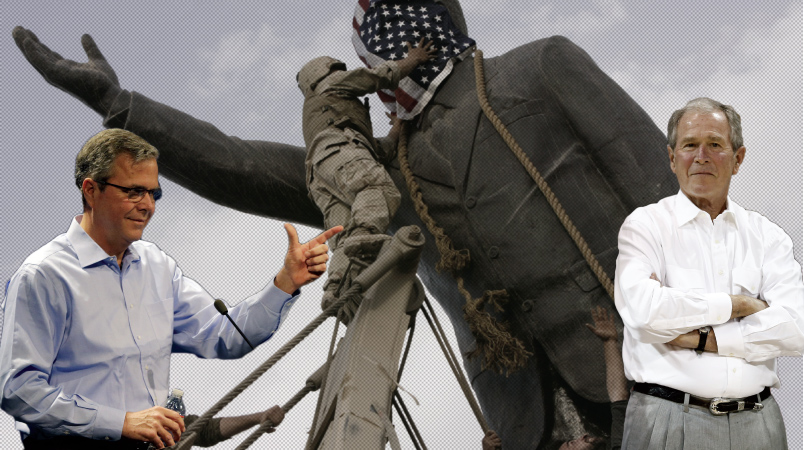I mentioned a couple days ago that this might be happening. And now I think we’re seeing that it is. Improbably, Jeb Bush’s run for president and painful bumbling have triggered, though by no means caused, a watershed moment in the country’s reckoning with the strategic blunder – and let’s just say it – self-inflicted catastrophe of the Iraq War.
It was one thing when John Kasich and Chris Christie said they would not have invaded Iraq – guys who would run as relative moderates and either aren’t running or don’t realize they’re not running for president. (Rand Paul said the same but that’s no surprise.) But now we have Marco Rubio and Ted Cruz saying they would not have either. Rubio is the big tell here since he among all the 2016 contenders is angling for the support of the neoconservative foreign policy intelligentsia. If he can say categorically that it was a mistake, the debate is probably really finally over.
From one perspective, this may not seem surprising. With everything that has happened over the last dozen years, including events of just the last year, it’s very hard to say that the invasion was a good idea. But people say lots of things that are either hard or downright ridiculous to say. Indeed, we should note that as recently as two months ago, Rubio was saying just the opposite, that invading Iraq was the right thing to do.
Certainly part of this is that everybody in the race has an immediate incentive to inflict as much damage on Jeb Bush as possible. But it goes well beyond that. Iraq has loomed large over every aspect of US politics and foreign policy for more than a decade. But the specific decision to launch the war was submerged for many years. In the years just after the war, support for the war was an article of faith for most Republicans. That fixed much of the public debate in place. Many elected Democrats, meanwhile, were trapped by their own votes in favor of Bush’s authorization to use force.
Later, Republicans moved the debate to the ‘surge’, where they did have a much better argument to make. Even though it didn’t change the big picture, many Democrats didn’t think the surge could work. But in the limited sense of tamping down the out-of-control insurgency through a mix of an intensified troop presence and payola to tribal leaders in Sunni regions of the country, violence did abate significantly. It created an opening for a political solution, which never ended up happening and perhaps could never happen. In the 2008 presidential race, the Iraq ‘debate’ was largely fought over who was right about the surge.
Since then, the fights of the Obama era pushed the Iraq debate to the sidelines. Public opinion has turned decisively against the war. But political fights have largely been fought over ISIS, whether there should have been a full pull-out from Iraq, chaos in Syria, Libya and Yemen and more.
We all sort of know that the ground has shifted on this issue. We can see it clearly in public opinion polls. But it is as though it’s been years since we actually had a show of hands – especially among national Republicans. Good idea? Bad idea? As I was writing this, Jeb Bush himself has now come forward and, on the fourth try, said the Iraq War was a mistake. What I’ve called that showing of hands seems to show virtually no one of any consequence standing up for the decision to invade. Maybe we all kind of knew that that was where people had gotten to. But seeing people say it is a transformative event.
Over that time, the ground has shifted not just on the facts of the issue, but on what is in many ways a more consequential front: Time has passed and Republicans simply don’t feel the same sort of partisan responsibility for the conflict. It’s drifting back into history. The sense of ideological and partisan commitment has just loosened – the intuitive reflex that says our guy did it so it must be right and I need to defend it. (It will be interesting to see what, if anything, Cheney, Rumsfeld, Wolfowitz, Kristol et al. have to say.)
Yes, each candidate has an incentive based on this race. But Cruz and Rubio especially are fighting for base Republicans. If they were still committed to the wisdom of the Iraq War, they wouldn’t be saying this. And yet they are. That is a major watershed in the country’s reckoning with the war. If Republicans running as hawks say it was a mistake, then the debate is really over.
And it won’t end there. Because with a consensus in place that the Iraq War was a bad idea, the whys and hows of just how we made this decision are up for discussion in a very new way.






